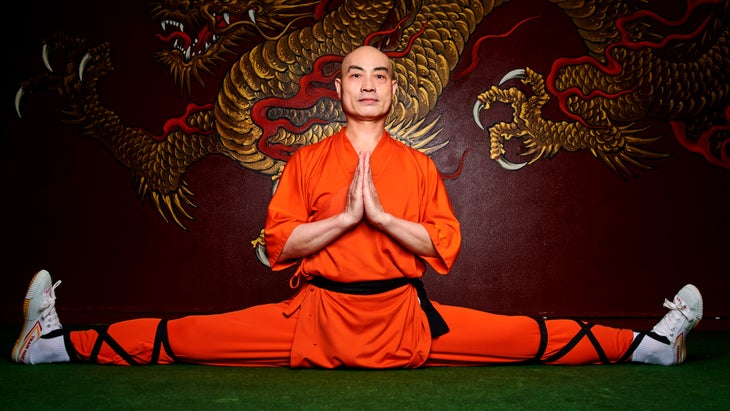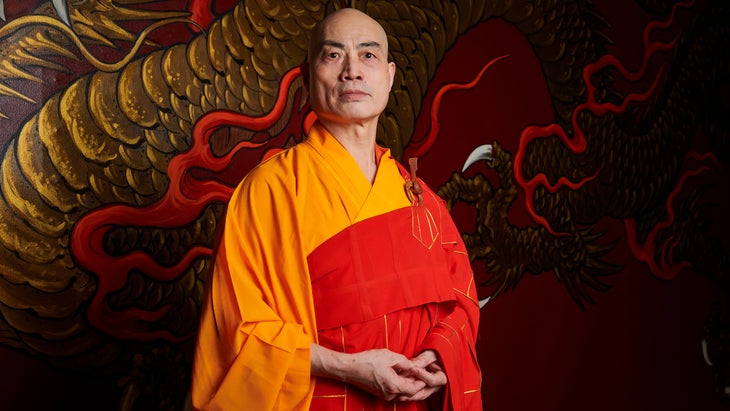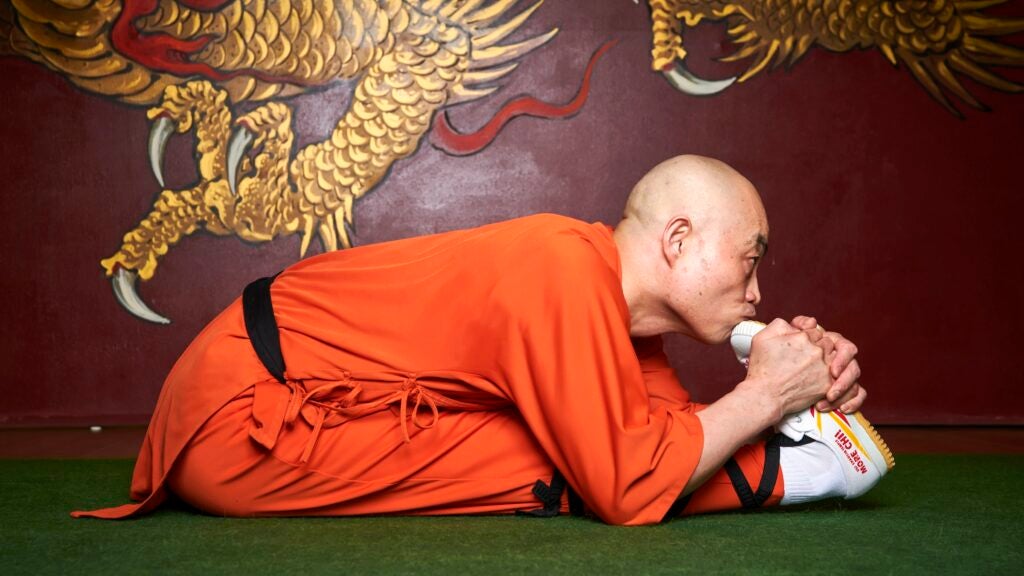No products in the cart.
Outdoor Adventure
Celebrity Kung Fu Monk Yan Ming Can’t Stop Running
Though Shi Yan Ming is a world-renowned kung fu master, he was lucky to survive a poverty-stricken childhood as a peasant in China.
He was born in 1964 in Henan Province, the heart-center of the country, where Chinese civilization is said to have originated, and food was scarce. Two siblings died of starvation prior to Yan Ming’s birth, and he was a very sickly child.
Fearing the same fate might befall him, his parents brought Yan Ming to the door of a 1,500-year-old Shaolin Temple. He was taken in by the monks there and began to live by the grueling schedule of a kung fu disciple—training, practicing, meditating, and running. His health, along with his skill, improved rapidly.
“I was running a lot in China,” recalled Shifu (an honorary title meaning “master” or “teacher”). “The temple was built in the woods, in a mountain range; I was running to build strength and endurance.”
In some ways, he has been running ever since.
Kung Fu Meets Hollywood
In 1992, Shifu was part of a group of Shaolin monks invited to perform on a U.S. tour. The temple in which he was raised had been the original Shaolin Temple, dating back to 495 A.D., and the lineage of monks practicing kung fu and Chan Buddhism (also known as Zen) helped establish Shaolin as one of the most graceful and disciplined martial arts. Shifu, a 34th generation master, and his fellow monks gained renown for their craft and were invited to display their skills on international tours.
After a show in San Francisco, California, he escaped his hotel room in the middle of the night and made his way by bus to New York City. He started the first Shaolin Temple in America in Chinatown, waking up early to go on training runs across the Brooklyn Bridge. In the intervening 30-plus years, he has taught countless others, from RZA of the Wu-Tang Clan to Björk to Wesley Snipes. He’s also appeared in several movies and helped spread the practice that has been his way of life.
Running is championed by many martial artists as a way to train both body and mind. Bruce Lee called running “the king of exercises,” and had a remarkably consistent routine to support his training. As an activity grounded in form, repetition, and discipline, it is no surprise that it is considered an essential part of training both physical and mental resilience. In recent years, Shaolin monks have even gone viral for their ability to “run” across water.
To Shifu, running is a form of “action meditation.” In kung fu, everything is an opportunity to hone one’s skill and wisdom. “Speaking is meditation,” noted Shifu. “Walking is meditation. Jogging is meditation. Everybody has different abilities. To help people individually, you can’t use one approach.”
RELATED: Rethinking the Cross-Training Paradox
Such diversity of teachings is at the heart of the welcoming nature of the temple and Shifu’s ability to meet students where they are. In doing so, Shifu aims to spread the Shaolin teachings of self-actualization, dignity, and compassion to as many people as possible. It is this spirit of inclusivity and access to a life-changing practice that has drawn so many to the temple.
Running and Kung Fu: A Whole Body Pursuit
Kirby Koo, a disciple of Shifu’s and the manager of the USA Shaolin Temple, stumbled into Shifu’s orbit seven years ago with the vague idea of getting in touch with her roots (she was raised partly in Hong Kong). After moving to New York, a childhood friend had told her that if she ever wanted to do kung fu, the best master on the planet was right there in Chinatown. She checked it out and hasn’t looked back.
“When you come from the depths of extreme poverty to training celebrities and being in Hollywood, you understand that everyone’s going through a journey and that we’re all the same,” Koo said, referring to Shifu’s ability to connect with people from all walks of life. “In the temple, everyone’s wearing the same uniform, everyone’s doing the same moves, and it doesn’t matter where you come from or what your bank account is.”

Still, embracing running was not something Koo envisioned when starting kung fu. “I used to be the type of person to be like, ‘When I run…I’m only running if it’s for my life,’” she said. Yet now Koo sees running as a form of meditation, a way to further the spiritual, mental, and physical training of kung fu by practicing with the whole body.
“Before training kung fu, I always understood that exercises are for different parts of your body—you do a bicep curl, you stretch your hamstring. But in order to maximize your power, speed, and endurance, in kung fu you use every part of your body for every move.”
Running is championed by many martial artists as a way to train both body and mind. Bruce Lee called running “the king of exercises.”
“Shifu says that the true gym is when you look into the jungle,” continued Koo. “Animals don’t lift weights. If you watch a cheetah, they use all their muscles to leap into the air and then they continue running, they don’t just use singular body parts.”
Look upon a trail or road and you might notice the same thing about a runner leaping and bounding with all of their muscles firing. This sense of a whole-body pursuit that is as much action as it is meditation—should one choose to perceive it that way—is perhaps where kung fu and running intersect.
At 59, Shifu doesn’t seem to be slowing down. Whenever he talks about practice, it is with language that is both nurturing and fierce, indicating the support and discipline required to inspire growth and maintain form.
“We are getting younger every day. We can work on getting younger every year,” said Shifu. “If you don’t sharpen a blade, it becomes rusty. We need to discipline ourselves to exercise. Young body, noble mind. Keep challenging yourself. Exercise your precious life.”

As Koo noted, her job at the USA Shaolin Temple would be a lot easier if Shifu wasn’t committed to teaching all day, every day. As the manager, Koo wouldn’t mind if the master slowed down once in a while and was more available for other aspects of temple administration. He has eschewed the potentially lucrative route that some masters of his renown might opt for, teaching only privately and emerging once in a while for a public showcase. But that is not Shifu; his aim is to make the temple and teachings available to all.
“If you’ve ever met anyone who knows what their life purpose is, rain or shine, that’s him,” said Koo. “That’s why he’s on Earth.”
Shifu wouldn’t disagree. “We have to take every opportunity we have to help out as many people as possible,” said Shifu, invoking the Buddhist roots at the heart of kung fu practice. “That’s why we’re here. You spread the word and help more people. That’s meditation.”
To Shifu, every moment, whether one is engaged in stillness or action, can be part of a way of life that is useful, powerful, and compassionate. And that is why, after all these years, Shifu is still running.

